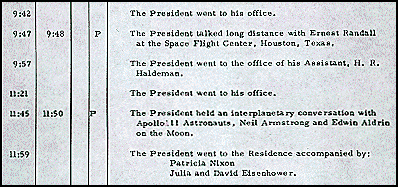



U.S. Recognition of the State of Israel
"The choice for our people, Mr. President, is between statehood and extermination." Chaim Weizmann
president of Jewish Agency for Palestine
to President Harry S. Truman,
April 9, 1948The creation of a Jewish state in Palestine was one of the most divisive issues of the Truman administration. On November 29, 1947, the United Nations agreed that Palestine, which had been a British mandate since 1922, would be divided into two new states: one Jewish, one Arab. The British would withdraw on May 14, 1948, when this partition plan would take effect.
As the deadline approached, U.S. policy on this question appeared to be in disarray. President Truman secretly assured the Jewish Agency for Palestine of U.S. support for the plan, while the State Department announced support of an alternative plan. As the violence between Jews and Arabs in Palestine escalated and as the British prepared to withdraw, President Truman, subjected to intense pressures, made his choice. On May 14, 1948, just 11 minutes after the State of Israel was proclaimed in Tel Aviv, President Truman released a statement recognizing the new Jewish state.
The statement recognizing the State of Israel is at the Harry S. Truman Library in Independence, Missouri.
The U.S. announces recognition of the State of Israel in a statement released, May 14, 1948.
Teaching suggestions related to the U.S. Recognition of Israel are available in the National Archives Digital Classroom.
Return to top
John F. Kennedy in Berlin on the Cold War
"There are some who say that Communism is the wave of the future. Let them come to Berlin." President John F. Kennedy
Berlin, Germany
June 26, 1963The cold war is the term for the rivalry between the two blocs of contending states that emerged following World War II. It was a series of confrontations and tests of wills between the non-Communist states, led by the United States and Great Britain, and the Communist bloc, led by the Soviet Union, that lasted 45 years, and at one point, drew the world to the brink of nuclear war.
In August 1961 the Soviets erected the Berlin Wall to stop the mass exodus of people fleeing Soviet East Berlin for West Berlin and the non-Communist world. The wall was a mass of concrete, barbed wire, and stone that cut into the heart of the city, separating families and friends. For 28 years, it stood as a grim symbol of the gulf between the Communist East and the non-Communist West. In 1989 the Berlin Wall fell, signalling the end of the cold war.
President John F. Kennedy's speech cards show his remarks in Berlin, June 26, 1963
Return to top
Richard M. Nixon and Apollo 11 Astronauts
"The President held an interplanetary conversation with Apollo 11 Astronauts, Neil Armstrong and Edwin Aldrin on the Moon." President Richard Nixon's Daily Diary
July 20, 1969In the late 1950s the United States watched the Soviet Union take the lead in the rapidly escalating space race. The Soviet lead was both embarrassing and menacing to a nation that prided itself on technological know-how. On May 25, 1961, when President John F. Kennedy challenged the nation to landing a man on the Moon before the end of the decade, he struck a responsive chord with the American people.
The Apollo program, created to meet the goal of landing men on the Moon, enlisted 20,000 companies, hundreds of thousands of individuals, and some 25.5 billion dollars. On July 20, 1969, astronauts of the Apollo 11 mission became the first humans to set foot on the Moon. The Moon landing was a stunning achievement that commanded world attention.
National Archives records relating to the space program are in the Records of the National Aeronautics and Space Administration (NASA) and at several Presidential libraries, including the Nixon Library.
President Richard M. Nixon's daily diary lists his telephone conversation with Apollo 11 astronauts on the moon, July 20, 1969.

Return to top
